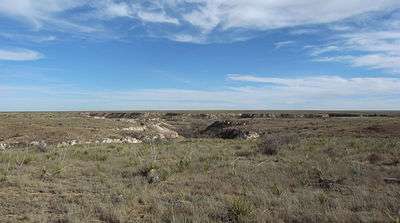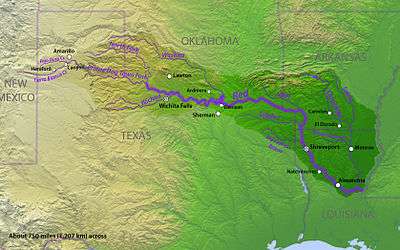Tierra Blanca Creek
| Tierra Blanca Creek | |
|---|---|
|
Canyon carved by Tierra Blanca Creek | |
|
Map of the Red River watershed | |
| Country | United States |
| Basin | |
| Main source |
Curry County, New Mexico 4,524 ft (1,379 m) 34°49′45″N 103°13′22″W / 34.8292321°N 103.2227271°W[1] |
| River mouth |
Randall County, Texas 3,471 ft (1,058 m) 35°00′10″N 101°54′09″W / 35.002778°N 101.902500°WCoordinates: 35°00′10″N 101°54′09″W / 35.002778°N 101.902500°W[1] |
| Physical characteristics | |
| Length | 109 mi (175 km) |
Tierra Blanca Creek is an ephemeral stream about 75 mi (121 km) long, heading in Curry County, New Mexico, flowing east-northeast across northern portions of the Llano Estacado to join Palo Duro Creek to form the Prairie Dog Town Fork Red River southeast of Amarillo, Texas.[2][3] Overall, Tierra Blanca Creek descends 1,050 ft (320 m) from its headwaters in Eastern New Mexico to its confluence with Palo Duro Creek at the head of Palo Duro Canyon.
The creek's water levels are variable, and it is not unusual for some parts of the creek to be reduced to a small trickle or even completely dry during the frequent periods of drought in the desert plateau of the northwestern Texas Panhandle. At the same time, as the sole creek bed draining a large region with frequent violent thunderstorms, it is also the site of significant occasional Flash floods. It's diminishing flow has been attributed to damming and agriculture.
Tierra Blanca Creek was a historically significant as the major running water source for the XIT Ranch, one of the largest cattle ranches in American history. It also contributed to the formation of Palo Duro Canyon, the second largest canyon in the United States.[3]
The Name
Tierra Blanca is Spanish for "white earth". One theory suggests that the name refers to white deposits of Tertiary clay that are found along the sides of the valley.[4] Another theory suggests that it was the exposed traces of white caliche along the valley walls that gave this stream its Spanish name.[5]
See also
- List of rivers of Texas
- Buffalo Lake National Wildlife Refuge
- North Fork Red River
- Pease River
- Washita River
- Wichita River
References
- 1 2 U.S. Geological Survey Geographic Names Information System: Tierra Blanca Creek
- ↑ "An Analysis of Texas Waterways". Retrieved 2006-05-04.
- 1 2 Tierra Blanca Creek from the Handbook of Texas Online
- ↑ Gould, Charles Newton (1907). The geology and water resources of the western portion of the Panhandle of Texas. Water Supply Paper 191. United States Geological Survey. p. 12.
- ↑ Morris, John Miller (2009). Taming the Land: the Lost Postcard Photographs of the Texas High Plains. Texas A&M University Press. p. 179.
External links
- U.S. Geological Survey Geographic Names Information System: Tierra Blanca Creek
- Photos of the Llano Estacado
- Palo Duro Canyon State Park official website

